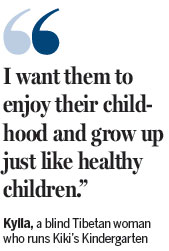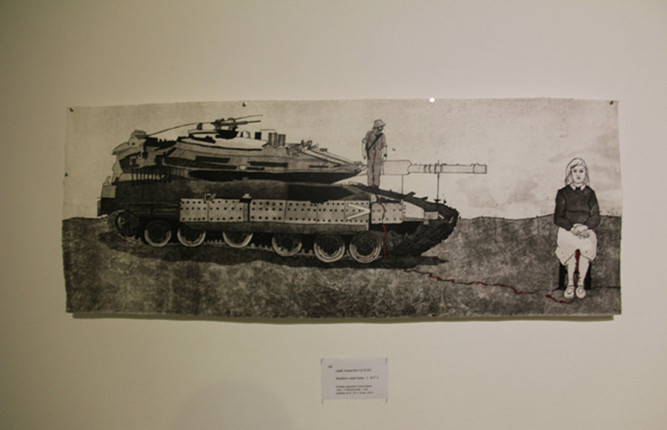A ray of hope for Tibet's blind children
Updated: 2015-10-29 08:06
By Xinhua(China Daily USA)
|
|||||||||
Kyila, 29, has lived in darkness since she was born.
But she likes teaching her students, who are also blind, Tibetan songs. "We all have bright and beautiful eyes. I see the beautiful souls in the world, and you see the light in our hearts," reads a line from one.
Kyila says during the first 12 years of her life she was placed in a safe corner at home, "always waiting for my parents to dress or feed me".
Like many other Tibetans who believe in reincarnation, her parents considered her blindness a punishment for sins in the previous life.
"I was sad when people sighed and lamented my fate," she said.
But in her 13th year, Kyila's luck changed, thanks to Sabriye Tenberken, a German woman who herself is blind.
At Tenberken's school for blind children on the Tibetan plateau, Kyila learned to read and write in Braille, Tibetan, Chinese and English.
She also learned computer and therapeutic massage skills, and was given the opportunity to study in the United States, Britain, Canada and Germany.
In 2011, Kyila opened her own kindergarten for visually impaired children and named it "Kiki's Kindergarten." Kiki means "happiness" in Tibetan.
"In my kindergarten, blind children play, run around and climb trees with their friends. They learn important skills and discover it is not the end of the world to be blind," Kyila said.

The kindergarten is a non-governmental organization and works with the Tibet Disabled Persons Federation and Braille Without Borders.
Its annual operating cost of 200,000 yuan ($31,420) is mostly covered by donations from individuals and organizations from China and abroad.
It started with only eight children, all of whom entered primary school after having acquired basic life and communication skills in kindergarten. It now has 26 students aged 4 to 7, all from poor Tibetan families in remote areas who are given free food, board and tuition.
"I want them to enjoy their childhood and grow up just like healthy children," said Kyila.
The children are taught to sing, dance, paint, read Braille and play musical instruments. The kindergarten has several instruments, including an accordion, a guitar and an electronic organ.
They paint with scented crayons whose colors are distinguishable by smell: green has an apple scent, and pink smells like strawberry.
On sunny days, Kyila takes the children to play games and picnic in the fields.
Except for three full-time nurses, most of Kyila's colleagues are volunteers, and include teachers, doctors and students.
Kyila is busy putting the finishing touches on a new campus, and next month she will move the kindergarten from her home city of Xigaze to Lhasa.
"The two-story building has been refurbished and I've placed orders for furniture."
The decision to move was not made lightly.
"One winter's night in 2013, eight children had a high fever. I took them to a hospital in Xigaze, but was told the doctors there were not experienced enough to provide adequate treatment," said Kyila.
She and her colleagues spent six hours rushing the children to Lhasa.
Fortunately, they were treated in time and recovered quickly but the nightmarish experience taught Kyila that the kindergarten had to move.
"Had their cases been critical, that long journey could have put their lives at risk."
Rental costs for the new location are covered by a charity run by a temple in Shanghai.
"We are grateful for Kyila's care for the blind children," said Wangchen Geleg, deputy director of the Tibet Disabled Persons Federation.
"She's doing great work to help visually impaired people live a better life."
He said Tibet has about 200,000 disabled people, and the federation spent around 400,000 yuan on preschool education for disabled children between 2011 and 2014.
(China Daily USA 10/29/2015 page16)

 Ryan nominated for speaker
Ryan nominated for speaker
 Top 10 news apps favored by smartphone users
Top 10 news apps favored by smartphone users
 Intimate Transgressions: More than just pain
Intimate Transgressions: More than just pain
 Want a butler at your home?
Want a butler at your home?
 Rescue operations in full swing as quake death toll hits 365
Rescue operations in full swing as quake death toll hits 365
 Merkel's visits to China aimed at forging 'special' ties
Merkel's visits to China aimed at forging 'special' ties
 Netherlands king enjoys local flavors of Yan'an
Netherlands king enjoys local flavors of Yan'an
 NBA MVP Curry scores 40 points, Warriors win opener
NBA MVP Curry scores 40 points, Warriors win opener
Most Viewed
Editor's Picks

|

|

|

|

|

|
Today's Top News
Tu first Chinese to win Nobel Prize in Medicine
Huntsman says Sino-US relationship needs common goals
Xi pledges $2 billion to help developing countries
Young people from US look forward to Xi's state visit: Survey
US to accept more refugees than planned
Li calls on State-owned firms to tap more global markets
Apple's iOS App Store suffers first major attack
Japan enacts new security laws to overturn postwar pacifism
US Weekly

|

|








